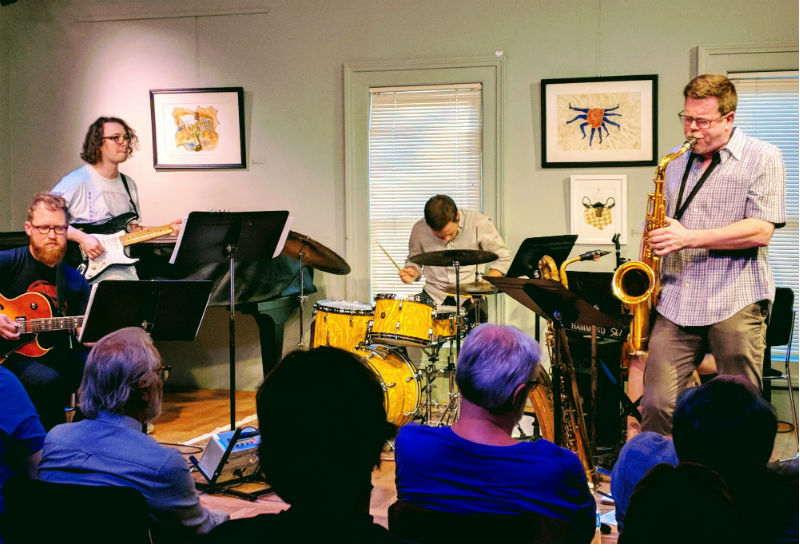Method Man: Ken Vandermark's Marker at Kerrytown Concert House

Ken Vandermark is a method musician.
The Chicago-based saxophonist/clarinetist likes to construct scenarios and systems for his various bands and then write material that fits whatever methods he's devised. It's rigorous work that forces Vandermark and his musicians out of their comfort zones, but it has led to a voluminous and varied body of work that is among the most impressive in modern jazz and composition.
Vandermark's latest creation, Maker, came to Kerrytown Concert House on July 9 and ripped through a four-song, 75-minute set that touched on avant-garde jazz, funk, drones, minimalism, and Afrobeat.
Maker was made to explore memory and how it can change time and order. The idea was partly inspired by San Soleil, a 1992 experimental film by Chris Marker that plays with nonlinearity and mixes fiction and nonfiction with no distinction. The movie opens with a context-setting quote from T. S. Eliot's 1930 poem "Ash Wednesday":
Because I know that time is always time
And place is always and only place
And what is actual is actual only for one time
And only for one place
Vandermark told the Columbia Free Times that he's seen San Soleil eight times, and each time he's viewed the movie he sees something new or misremembers a section. A fixed piece of art is unmoored in Vandermark's memory, with pieces fading in and out, foreshadowing or returning, turning time inside out -- which is what the band Maker does with music
For the band Maker, that means Vandermark, electric guitarists Andrew Clinkman and Steve Marquette, drummer Phil Sudderberg, and violinist/keyboardist Macie Stewart must move horizontally and vertically through the musical structures, presenting passages -- written and improvised -- and then tear them away, only to return to them later in the piece, altered in ways that are both familiar and new, with new sections superimposed over the old.
Marker released its debut album, Wired for Sound, in December 2017, recorded a year after the band started rehearsing in September 2016. It took Vandermark about six months to compose the band's first book of songs, taking pieces to practice to not only test drive them but to work out the kinks with a group of musicians he's never played with who are 20 to 30 years younger than the 53-year-old saxophonist.
But the kinks did come out and Marker is something else: alternately funky and freaky, either heavily composed or free, and always pushing forward.
For the Kerrytown show, Marker didn't perform any of the songs for Wired for Sound, or from its forthcoming album Homework 1: (For Muhal Richard Abrams, Curtis Mayfield & Dinah Washington). Instead, the band focused on a new book of music it just started learning six days prior to the tour kickoff in Ann Arbor. Marker is using this five-date tour to prep for its third studio recording, but the band already sounded remarkably tight with the new music and fully comfortable with Vandermark's complex system.
Marker began its set in front of about 40 people with "Alphaville," which Vandermark said is "a loose reference to a Goddard film." The saxophonist frequently uses filmmakers, artists, authors, and musicians as jumping off points for his compositions, dedicating the tunes to his inspirations with parenthetical nods in the song titles.
In the movie Alphaville, a sentient computer lords over the futuristic city by outlawing individualism, free thought, and emotions, but the device is destroyed by something it can't understand: poetry. Vandermark's "Alphaville" moves through what might be a nod to Paul Misraki's soundtrack with a violin medley that sounded perfect for a film noir before moving through drones and, over time, an avant-funk jam mostly over one guitar chord. Vandermark played clarinet and then tenor sax, but he's very much an ensemble player in Marker, not a featured soloist.
I didn't catch the name of the second tune, but before playing it Vandermark praised his bandmates: "These are all new pieces. These are very, very remarkable musicians." He described the song as having more of a jazz feel, which was true for a while as it featured swinging drums and boppish solos. But the song left jazz entirely when it broke into a noisy, funky workout, which concluded with Vandermark on tenor after he started the song on baritone.
When introducing the third composition, "Roulette," Vandermark said it's the second song he's written with that name. The first tune with that title is a ferociously funky number on The Vandermark 5's 2000 album Burn the Incline. The new "Roulette," which has Vandermark on baritone sax and clarinet, is more subdued and has Eastern European tonalities at times. "The difference between the two is a case study in Vandermark," he said. "There must be a Ph.D. in there somewhere. I'd give them a really good grade."
Maker wrapped its set with "L'argent," named after the Robert Bresson movie, which was loosely inspired by the first part of Leo Tolstoy's 1904 novella The Forged Coupon. The tune had an Afrobeat vibe at the start and gradually became more textural, tonal, and less rhythmic by its conclusion.
While it's unclear how the film influenced the song, there was no doubt Vandermark had a specific intent behind his mash-up methodology.
Christopher Porter is a library technician and the editor of Pulp.



































Comments
edd
edd
Beautifully wrote article…
Beautifully wrote article. It should be here en.wikipedia.org/wiki/Main_Page right?